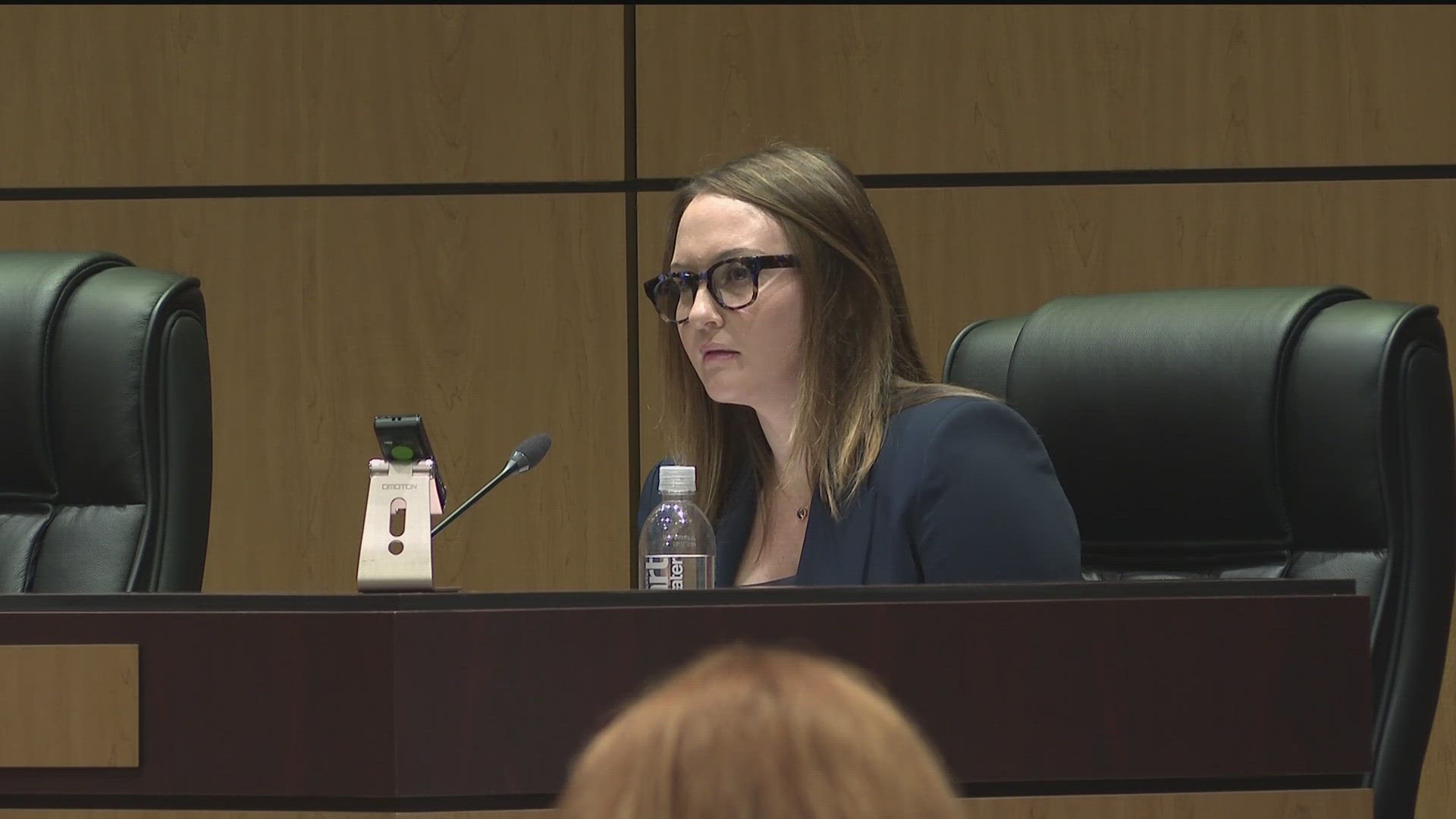COBB COUNTY, Ga. — The termination hearing for a Cobb County teacher over bringing in a book to class on gender identity and allegedly running afoul of Georgia's "divisive concepts" education law began Thursday morning.
The hearing for educator Katherine Rinderle, which started at 9 a.m., is taking place at the Cobb County School District Office in Marietta.
RELATED: Cobb County educator faces termination over controversial book: Georgia's 'Divisive Concepts Law'
In a video released by the Southern Poverty Law Center in June, Rinderle spoke out about her predicament in finding herself at the center of a heated battle over the new state law.
Rinderle claims that her actions, which involved bringing the book "My Shadow Is Purple" to her classroom, have led to a recommendation for her termination by the Cobb County School District.
"All of a sudden, I saw myself on the outside with my administration and the parents on the other side," Rinderle said.
The Due West Elementary fifth-grade teacher sat in front of district leaders and the attorney representing the district answering questions Thursday.
"You understand that some parents believe that 10 and 11-year-old children are not developmentally ready to have a classroom on gender identity and gender beyond non-binary?" attorney Sherry Culves asked.
"I believe all parents have different viewpoints," Rinderle answered.
Much of the questioning involved the contents of the books and how Rinderle got her hands on it.
During the hearing, she explained she picked up "My Shadow Is Purple" from her school's own book fair and that her students chose to read it out of several options.
"Do you know whether parents of the students in your fifth-grade target class had already had an opportunity to talk about this topic with their children?" Culves asked.
"No, and I don't know what topic," Rinderle said.
"The topic of gender identity," Culves said.
"I do not know that," Rinderle answered during the hearing.
"My Shadow Is Purple," a book allegedly chosen by Rinderle's students that addresses the topic of gender identity, was challenged by a concerned parent. In response, the Cobb County School District recommended that Rinderle be fired, invoking Georgia's Divisive Concepts law, which was signed into law last year.
Groups who were in attendance, including Georgia's 2020-2021 Teacher of the Year took issue with the line of questioning from the district and defended Rinderle saying its an attack on educators.
"Truly, the reason I was selected to be Georgia Teacher of the Year is for the exact type of teaching they're trying to ban," Tracey Nance said. "It really highlights how vague the law is."
Witnesses were also called upon during the hearing, such as Christopher Dowd who handles district-level personnel matters.
"The district found Ms. Rinderle to be adversarial, deceptive," he said.
He explained a student expressed anger over the book's content and having a lesson about it, which prompted parental concern.
"That was their main concern, how much emotion it evoked from the student," he said.
No decision on Rinderle's employment was made Thursday.
More on Georgia's Divisive Concepts law
This legislation places restrictions on how grade school teachers can discuss race and other topics in the classroom. Proponents, including Georgia Governor Kemp and other Republicans, argue that the law prohibits the teaching of "divisive" concepts.
The law specifically prohibits the promotion of claims that the United States is fundamentally or systematically racist, that any group of people is inherently racist or oppressive, and that individuals should not experience psychological distress based on their race. Other topics include gender and sex.
Similar bills with identical language have been proposed in numerous states, with support from the Center for Renewing America, a think tank led by former President Donald Trump administration officials.
When complaints are lodged against school districts, they must respond accordingly, and dissatisfied parties have the option to appeal to the state Board of Education. If the board determines that the school district is at fault, it has the authority to suspend some or all of the district's waivers from state regulation.
Laws similar to Georgia's have faced legal challenges in several states, including Florida, Ohio, Oklahoma, and New Hampshire. Critics argue that these laws amount to censorship in the classroom, impeding educators' ability to provide accurate historical context and denying students an accurate education.
This legislation places restrictions on how grade school teachers can discuss race and other topics in the classroom. Proponents, including Georgia Governor Kemp and other Republicans, argue that the law prohibits the teaching of "divisive" concepts.
The law specifically prohibits the promotion of claims that the United States is fundamentally or systematically racist, that any group of people is inherently racist or oppressive, and that individuals should not experience psychological distress based on their race. Other topics include gender and sex.
Similar bills with identical language have been proposed in numerous states, with support from the Center for Renewing America, a think tank led by former President Donald Trump administration officials.
When complaints are lodged against school districts, they must respond accordingly, and dissatisfied parties have the option to appeal to the state Board of Education. If the board determines that the school district is at fault, it has the authority to suspend some or all of the district's waivers from state regulation.
Laws similar to Georgia's have faced legal challenges in several states, including Florida, Ohio, Oklahoma, and New Hampshire. Critics argue that these laws amount to censorship in the classroom, impeding educators' ability to provide accurate historical context and denying students an accurate education.

